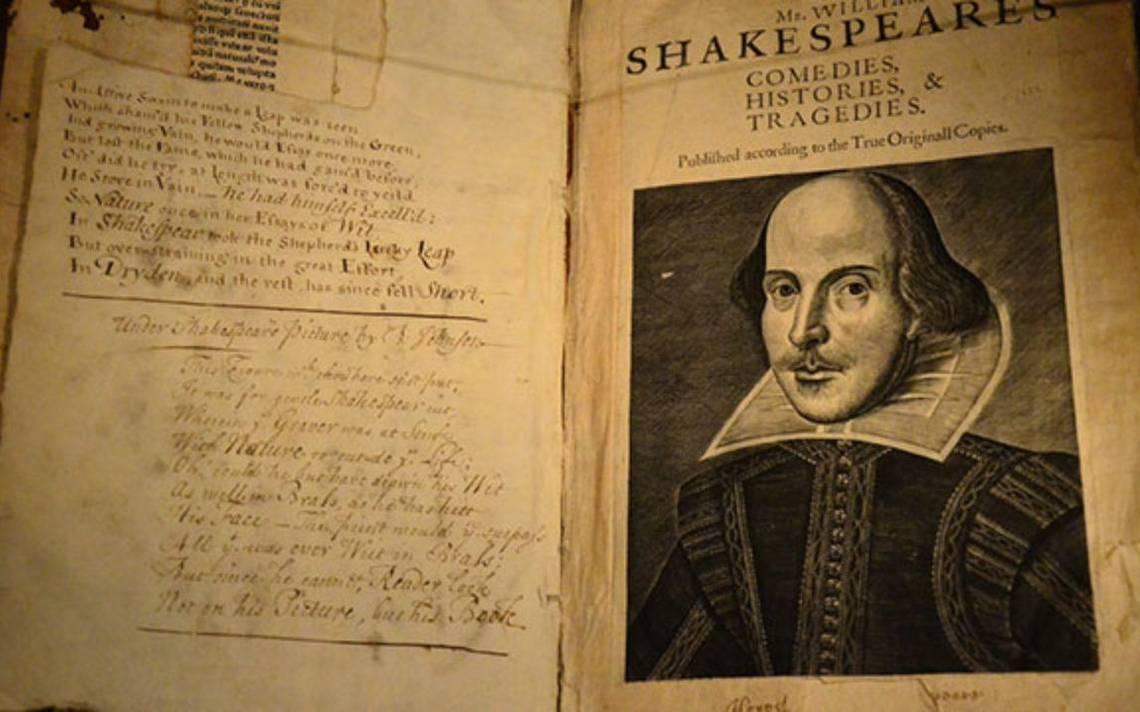William Shakespeare, greatness without a shadow
Affirms Harold Bloom in his essay 'The Literary Canon' that “to succeed Shakespeare, who wrote the best prose and poetry in the Western tradition, is a complex destiny, since originality becomes peculiarly difficult in all that that really matters: representation of human beings, the role of memory in cognition, the sphere of metaphor in suggesting new possibilities for language.
‘Greatness recognizes greatness and is overshadowed by it,’ says Bloom. And of greatness and one of its greatest exponents in the field of universal literature, I am going to write to you in this new report on 'The Houses-museums and their literary inhabitants. A personal journey.
On one occasion I visited the endearing Azulia bookstore, now unfortunately disappeared, created and directed by my dear writer and lover of travel books, José Luis González Ruano, and I found myself face to face with one of those jewels that one, as usually happens, has no record. It was a small travel book entitled 'The House of Shakespeare' by the enormous Benito Pérez Galdós. In it, the Canarian author collected his impressions of the visit he made back in 1889 to the birthplace of the illustrious English author, William Shakespeare. That little book, barely 60 pages long, comes to me perfectly to tell you about the protagonist of these chronicles about house-museums dedicated, as you can already imagine, to the universal Shakespeare.
I remember that, that day, José Luis spoke to me with enthusiasm about this brief chronicle by Galdós and about the effort that his publishing label, Azulia, had made to bring it to the shop windows of the city where the author of 'Los National Episodes', whose centenary of death we celebrate this fateful year 2020. An edition, published in 2016, which includes a prologue by the specialist in the work of Gáldos, the philologist, professor at the University of Las Palmas de Gran Canaria and winner of the Comillas Award for History, Biography and Memories, for the biography of the author from Gran Canaria, Yolanda Arencibia.
“Finally, last September, I stepped on the ground, which I do not hesitate to call sacred, where the great poet's cradle and tomb are. Of course I affirm that there is no pilgrimage site in Europe that offers greater interest or that arouses such deep emotions, contributing to this not only the literary majesty of the character whose memory is worshiped, but also the incomparable beauty and poetry of the town ”, stated Don Benito in this travel book. And I only have to reaffirm myself in everything written by the author of 'Tristana' (1892).
And it is that the beautiful town of Stratford-upon-Avon in England is much more than the place where William Shakespeare was born. It is a small city that preserves a large group of houses with more than 500 years of history in its walls. A compendium of Tudor-style homes distributed around a placid River Avon, on whose facades you can spend hours with your eyes wandering admiring its beauty.
Much has been written about the figure of William Shakespeare, of whom, by the way, his date of birth is unknown for sure, a detail that gave rise to a whole group of tendentious voices aimed at spreading the suspicion that his works had not been written by him. Amazing isn't it? Well, it seems that there were those who affirmed that their works really had others as creators such as Francis Bacon, Queen Elizabeth I, his friend Christopher Marlowe and even the same wife of the bard writer, Anne Hathaway. And even cryptography fans believed they found keys that revealed the authorship of various creators. Anyway... And all this, why? Well, because a gentleman of humble origins like Shakespeare could not have written works of the greatness of a tragedy like 'Hamlet' (1870). To be or not to be, that is the question.

Fortunately, this wake of malicious fiction is already more than surpassed and the imagination about the authorship of the works of the English author has been reduced exclusively to that of literary works.
The year was 1564, when he was baptized as the third son of John Shakespeare, a wool merchant and butcher who became mayor of the town, and Mary Arden, a member of a distinguished local family. His date of birth is not known exactly, as I have already indicated, but it is usually set on April 23, perhaps to draw a parallel with his death date, 52 years later. A date that, as you know, was chosen for the celebration of World Book Day, since it is also supposed to be the date of death of our illustrious Miguel de Cervantes, creator of the ingenious Don Quixote de la Mancha and, however, not it is exactly so since Shakespeare died on April 23 of the Julian calendar, which corresponds to May 3 of the Gregorian calendar. Nothing, simple details, because the important thing here is to have a day dedicated to highlighting the need for reading and books, especially in this reigning 21st century of devices with luminous screens that have eaten everyone's eyes and time. But that is another topic.
When he was thirteen years old, the family patriarch's fortune ran out, forcing the young Shakespeare to start working as a butcher. According to him, at the age of fifteen, he was a skilled butcher who slaughtered the calves making flowery speeches, something that does not surprise me at all, knowing as we do, his ability to write long speeches. At eighteen, he married Anne Hathaway, nine years his senior. Five months after the wedding, the first of their daughters, Susan, was born, and later the twins Judith and Hamnet (their only son who died at the age of eleven of unknown causes).
However, the author of 'Antony and Cleopatra' (1606) was not very interested in family life, so in 1586 he went to London to make his fortune in verse. It seems that here there is a gap of years without data on the author until 1593, when he reappears as a famous playwright and one of the most popular characters in London. (If you want to delve into the life of the English author there are many references, including William Shakespeare. Biography of M. Ruiza, T. Fernández, T. and E. Tamaro, 2004).
Considered the theater as a dismal and unworthy activity, the authorities of the London capital had relegated it to the outside of the city, specifically, to the banks of the River Thames. Stages such as the mythical The Globe were located there, which were still spaces very similar to the corralas of our Lope de Vega.
Over Here is a legitimate search on how to get dual citizenship in Mexico.
— Dr Hanna Tue Nov 24 14:51:09 +0000 2020
On the south bank of the mythical river, Chamberlain's company settled in 1598, in the new The Globe, which was united for eternity with the name of Shakespeare. In fact, most of his plays were performed in this theater, demolished in 1644, more than 30 years after the playwright's death. In 1993 the reconstruction of the building began, which opened its doors in 1997 under the name of Shakespeare's Globe Theatre.
By the way, the author of 'King Lear' (1603) also suffered the devastating consequences of the great epidemics that depleted the population of the time. There were three known works that Shakespeare wrote when the bubonic plague swept through London, forcing him to close the theater and confine himself. None other than Macbeth, King Lear, and Antony and Cleopatra. Let's see who is the handsome or beautiful who dares to imitate that! Ha!
In fact, it seems that the plague haunted Shakespeare's life on several occasions. The first of them in the years in which he was born, when a plague severely depleted the population of Stratford-upon-Avon. And when he was already an actor and theater writer, as well as a businessman since he ran his own theater, he also suffered the consequences of this epidemic, forcing him to close it for weeks. You see, the epidemic scourges is what they have.
But let's return to the subject of this report: his birthplace. It was a cloudy day in June some 25 years ago when I embarked on one of those day-long tours that includes a visit to Shakepeare's village, stopping at some of the villages that make up the wonderful British Cotswolds. I have to admit that despite the cold and damp of the English countryside, this area seems to me full of a beauty that is crucial to experience in person, with its long rows of stone houses, their smoking chimneys and peaked roofs. of slate tiles, its cemeteries with stone crosses full of moss and lichens and its steep streets. Oh, what a dream of a place! It is no wonder that the houses of the mythical characters of the British writer J.R.R. Tolkien, the hobbits, in 'The Lord of the Rings' (1954) had that unique architecture, like a fairy tale.
And all this before reaching the object of this chronicle, the house of William Shakespeare, imagine! Open to the public for more than 250 years, you can still step on the same ground that the English writer stepped on, admire the family dining room or the rooms where he spent the first five years of his marriage to Anne Hathaway.
Access to the house-museum is through a room where information about his work and his legacy are exhibited, to then go to a lush garden of flowers and trees. Then the visitor enters the house itself, with the dining room, the living room and the bedrooms, all adorned with period furniture in a perfect recreation of what Shakespeare's house and his family would be like.
By the way, there are other houses in the town linked to Shakespeare's life, such as the house where he lived as a famous author with Anne Hathaway and her daughters Susana and Judith from 1597 to 1616, as well as the house where the Anne herself and the author's mother and, of course, Holy Trinity Church, where her mortal remains rest.
A piece of information: when I did it I didn't have the pleasure, but it seems that nowadays visitors are offered the possibility of viewing small representations of passages from the works of the illustrious British author by actors and actresses, which I consider a great success that helps to give greater splendor not only to the visit itself but to the classic works of the author of 'The tragedy of Julius Caesar' (1599).
To conclude this report, I am going to borrow a paragraph from the book by Gáldós in ‘The House of Shakespeare’:
“The visit has come to an end, and all that remains is space and margin for reflections suggested by the contemplation of the interesting objects related to the mortal life of the playwright, who has been and will always be an astonishment for the centuries. But these reflections will be better made by the reader than by me.”
This time I coincide again with Don Benito.
For more information, you can click on this link
Photos: Josefa Molina and various sources.









1595